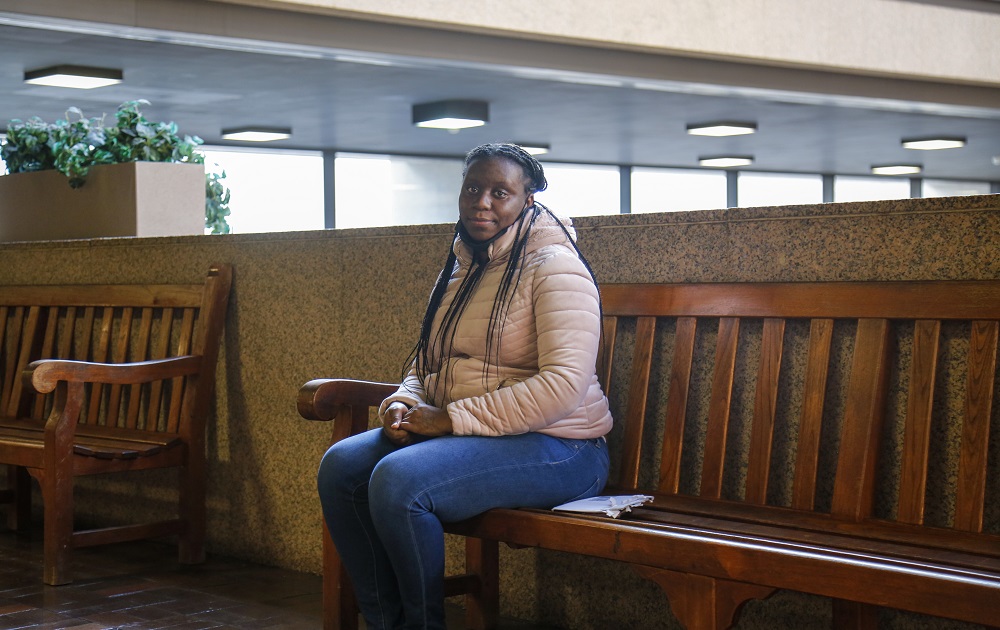CLEVELAND — Although she was careful — always certain to mask up in public — 19 months into the pandemic, Kiana Taylor caught a bad case of COVID.
Taylor, a caregiver in Twinsburg, Ohio, a suburb south of Cleveland, lost her job and, battling the effects of long COVID, struggled to find a new one.
By October 2022, she owed $4,500 in back rent on what she called a “mice infested” two-bedroom apartment and knew she and her 12-year old daughter were facing eviction. She applied for emergency rental assistance from the Cleveland Housing Network, but her landlord refused to accept a letter promising future payment: On November 9, the property manager at Brooklyner Bay Apartments in Cleveland filed for eviction.
So Taylor sent her daughter to live with her mother on Cleveland’s east side — transferring her to a new middle school and shielding her from the legal process — and moved herself into a string of west side budget hotels.
“I’m like, ‘I don’t want eviction in my name,’” Taylor said. “I got scared. So I left.”
But a new city ordinance could make it possible for Taylor to remain in her two-bedroom without the threat of being kicked out.
On Aug. 10, two months before Taylor fled her apartment in Cleveland’s Brooklyn Centre neighborhood, the Cleveland City Council passed “Pay to Stay” legislation that allows tenants to halt eviction proceedings if they can show — via, say, a Section 8 voucher or letter from a rental assistance agency — that they will soon have money to pay off at least part of what they owe. Eleven other Ohio cities already have similar rules in place, including Cincinnati and Dayton. Nationally, some major cities have passed their own versions, such as New York City’s Pay Transparency Law and Los Angeles’ Tenant Protection Resolution.
For Taylor, Cleveland’s new law means that the letter she gave her landlord from the Cleveland Housing Network saying she would soon receive $4,500 in emergency vouchers should have protected them from eviction.
“It gives the tenant a fighting chance,” Sally Martin, head of Cleveland’s Department of Housing, said. “And so that knowing the money is coming and a letter stating the money is coming should suffice as tender of rent.”
“We can show up now with $100 or $200, and [landlords] would have to take it,” Josiah Quarles, an organizing director at the Northeast Ohio Coalition for the Homeless, said. “That previously wasn’t the case.”
“ There is a wealth of information that says moves are not always bad. But frequent moves are — and disrupt social networks, academic progress.”
With Cleveland gaining a reputation as one of the worst U.S. cities for Black women, passing Pay to Stay was, advocates say, a key step in enhancing equity for current and would-be renters. According to a 2019 report on evictions in Cleveland published by Case Western Reserve University and the Center on Urban Poverty and Community Development, the majority of tenants that cycle through the city’s housing court are low-income Black mothers.
As to why Black women — who constitute 80% of Cleveland’s evicted — are the face of eviction, the report points to two factors that have contributed to a surge in evictions, comparing such rise to other Midwestern cities like Milwaukee: low wages and the burden of children to the landlord.
And with the eviction rate for Black renters being, in some ZIP codes, nearly double the rate as in white neighborhoods, evictions can have far-reaching consequences that extend past a miserable day with a housing magistrate.
Princeton University sociologist Matthew Desmond found in a study of 2,676 mothers and their children that eviction led to, on average, a half-decade of poor health, maternal depression and stress for parents, and poor grades and broken friendships for kids.
Moreover, according to Desmond’s research, high eviction rates are also correlated with the number of children a family has. Thus, having kids, Desmond concluded in his 2014 book “Evicted,” makes a woman three times more likely than her childless counterparts to get kicked out of housing.
“There is a wealth of information that says moves are not always bad,” April Urban, a researcher who produced the Cleveland eviction study, says about the effect on children. “But frequent moves are — and disrupt social networks, academic progress.”
In that study, which analyzed 88 tenants and 450 eviction cases in Cleveland, researchers discovered that landlords were more likely to evict women with children than those without. Half of those who had evictions filed against them allegedly owed two months or less of delinquent rent. The study also included reports of landlords refusing full or partial payment.
But because of the way Cleveland’s Pay to Stay law is written, the impetus is wholly on the tenant to mention their promise of payment and convince the magistrate with, in housing court.
That’s why Cleveland’s Department of Housing, the Northeast Ohio Coalition for the Homeless and several Cleveland city council members are working to publicize the new law through canvassing door-to-door, public meet-and-greets and street flyers.
“It all comes down to housing stability,” said Martin of Cleveland’s Department of Housing. “The cornerstone of your general stability in your wellbeing is knowing that you have a house to come home to every day.”

Mark Oprea/For Youth Today
The Justice Center in Downtown Cleveland, where 4,000 eviction cases are filed every year. Pay To Stay legislation, advocates say, could reduce those numbers.
Some landlords, like Shona Drake, balance knowledge of how eviction can hurt families with the desire to be paid for their investments. In 2003, while working as a hairdresser, Drake was short on her $700 rent for a single-family home in the Cleveland suburb of Euclid and was evicted. The experience of hiding the shame from her 7-year-old daughter, and sleeping in her car, led to a personal revelation: “I had vowed I would never be homeless again,” Drake said.
In 2009, amid the national foreclosure crisis, Drake leveraged her savings as a salon worker to become a landlord, and began renting east side homes out for $600, mostly to family or friends. The intention was a bit optimistic: Drake thought she would be least likely to suffer a difficult tenant if she was familiar with the name on the lease.
Regardless, in 2015, Drake posted her first eviction slip notice — on her best friend’s door. The eviction came after a disagreement, Drake said, and her friend’s inability to pay rent due to a diagnosis of multiple sclerosis.
On November 19, 2022, she filed her fourth eviction, against a 28-year-old woman who, Drake said, has “not paid a cent” since her $500 security deposit last March. Arguments abounded since Drake said. One week, it was the quality of the appliances. Next, the furnace.
“Now, her boyfriend is threatening me. They’re tearing up my flooring,” she said.
In court four times in November for the same case, Drake sees Pay To Stay as a “pro-tenant” wave of legislation that enables “entitled” renters to abuse landlord policy.
“I understand it, I was homeless before,” Drake said thirty minutes before her court hearing at the Cleveland Justice Center. On her lap is some 130 pages of her evidence including annotated text messages and subpoenaed orders from Dominion Energy to combat accusations that the gas was never turned on.
“I know they evict people for one day missing [rent], throw their stuff on the curb,” Drake said. “But I just need this to be fair. Right now, it’s not fair.”
Later that morning, Taylor, the caregiver from Twinsburg, walked in alone and masked to see Magistrate Edward Gregory in the magistrate’s fifth hearing on the day’s eviction docket. Since Nov. 9, Taylor has decided to divulge a bit to her daughter about her living situation, which, as she talks about it to a reporter, brings Taylor to tears.
“She’s at school right now,” Taylor said. “But she’s, like, so worried about me being sad and stuff like that. Because, you know, I have to hurry up and get myself together.”
From a Zoom call in Housing Court’s Mediation Room — magistrates haven’t held in-person hearings since February 2020 — Taylor eventually accepts Gregory’s offer of right-to-counsel. (Cleveland’s Pay to Stay legislation also gave all tenants with children the right to free legal representation at eviction hearings.) Like two other mothers on the day’s docket, she’ll return next week to continue her case with a Legal Aid attorney — who could, it’s possible, ensure the landlord at Brooklyner Bay accepts a promise of payment. (Brooklyner Bay did not respond to a call for comment.)
Or, as Taylor hopes, accept a payment plan now that she’s in a better financial situation.
“I got my old job back,” Taylor said, wiping away tears in the hallway. “I just started back — so now I’m able to provide for myself. But I still don’t have a home.”
***
Mark Oprea is a journalist based in Cleveland. He’s contributed to TIME, NPR, Narratively and is a staff writer for the Cleveland Scene. He’s reported from Italy, Mexico and the American Midwest.




























